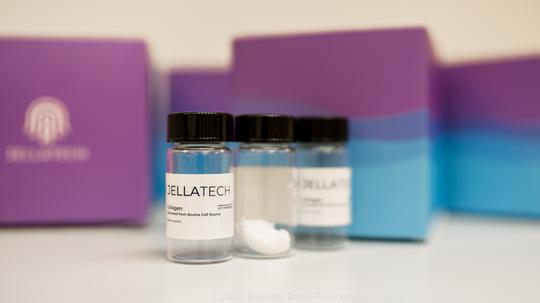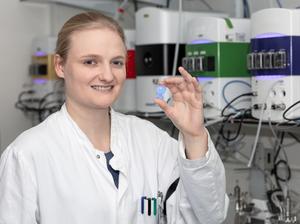
Two years in, and the eureka moment is finally here for Raleigh biotech startup Jellatech. Yes, you can grow collagen in a lab, CEO Stephanie Michelsen said.
Jellatech has developed what it describes as a “full length, triple helical and functional collagen” made from its own proprietary cell lines. Collagen is a protein that’s only found in animals. Jellatech is trying to change that through complex science at its tiny lab in Raleigh.
The jargon is complicated. A triple-helical protein provides structure to cells and tissue.
But what it boils down to is opportunity.
Collagen is widely used across industries, making up a potential $8.4 billion market. The cells that Jellatech scientists are replicating could mean a new direction for pharmaceutical, cosmetic and even food products.
It’s deep science, and it’s taken persistence and dollars to get this far. And it will take more of both for products to make it to an end user. But Michelsen says she knows it will happen.
She and her team are believers. They see a future where there’s an alternative to animal proteins – a way to save on the CO2 emissions and other environmental issues caused by factory farming. If all goes as expected, the firm could be just a few years away from seeing its collagen in a product – and Michelsen can’t say it without smiling.

The eureka moment was when the firm was able to extract enough collagen from cells grown in a lab to see it with the naked eye. Michelsen said the firm had suspected it was possible. Its scientists thought the collagen was being created – but for a while it was at such a small scale that it was impossible to detect.
The team was growing cells and isolating proteins, fine-tuning and measuring.
Juan Camacho a scientist at Jellatech, explains how it works. The first step is securing “a relatively small biopsy” from an animal. Then scientists process and isolate cells “which we can later expand into millions, probably trillions of cells at this point.”
Additives are added to boost collagen production. “From there, we are able to harvest all the collagen that they have made and purify it,” Camacho said.
Recently, the team was able to get the cells to the point where there was enough collagen being produced that they could actually see it.
“I almost cried when I saw the proteins,” Michelsen said.
“What’s next for us is to scale,” she said. “The team has proven that we can do this … now we just need to do it on a bigger scale.”
Michelsen said there’s also potential that the firm could someday use the same platform to make other proteins. “We want to be able to help give people a more sustainable and ethical alternative to animals,” she said.
Now the company is ready to move to a pilot scale – basically isolating more of the collagen. It recently sent out its first sample, a couple hundred milligrams to an unidentified partner in the biomed space.
“We’re looking at, right now, two to three years before we can seek out more commercial contracts,” she said. Already, the firm is working with eight partners and getting samples out for third-party validation.
Jellatech has six full-time employees and recently moved its entire operation – including the lab – to the Triangle from the Netherlands. The next step is to raise more money – the firm raised $2 million last year – so it can move into a bigger office and lab space.
Michelsen started on the idea of creating collagen and gelatin for food applications. But the firm has since realized that there’s an even bigger demand in the biopharma space – things like coatings for implants and even dermal fillers.
So biopharma is the first target.
“As we scale and grow bigger, we want to target, as well, cosmetics, personal care and food and beverage,” Michelsen said.


